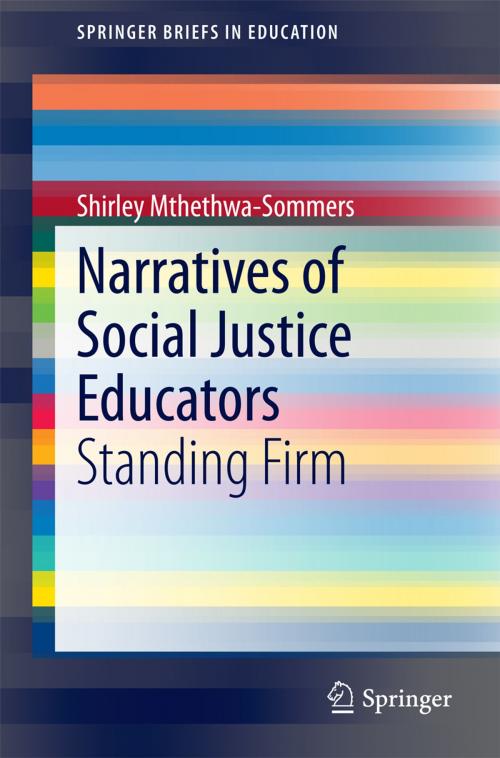Narratives of Social Justice Educators
Standing Firm
Nonfiction, Reference & Language, Education & Teaching, Educational Theory, Educational Reform, Philosophy & Social Aspects| Author: | Shirley Mthethwa-Sommers | ISBN: | 9783319084312 |
| Publisher: | Springer International Publishing | Publication: | July 31, 2014 |
| Imprint: | Springer | Language: | English |
| Author: | Shirley Mthethwa-Sommers |
| ISBN: | 9783319084312 |
| Publisher: | Springer International Publishing |
| Publication: | July 31, 2014 |
| Imprint: | Springer |
| Language: | English |
This book presents narratives of eminent social justice educators, which provide a window into why these educators have made it their mission to educate for attainment of social justice; it succinctly defines what social justice education is and what it is not. Eleven nationally and internationally eminent narratives of social justice educators, namely, Beverly Daniel Tatum, Sonia Nieto, Kevin Kumashiro, Valerie Ooka Pang, Teresita Aguilar, Gaille Canella, Christine Sleeter, Julie Andrzejewski, Norma Bailey, Kent Koppelman, and Cathy Pohan, are featured. Racial, gender, socio-economic class, and sexuality diversity of the social justice educators enriches the book by providing multidimensional perspectives on the impact of social positioning in choosing to educate for social justice. Chapter One, “Introduction to Social Justice Educators,” provides an in-depth introduction to the social justice educators who are featured in the book. It delineates reasons they were selected to participate in the study of narratives for social justice educators. This chapter highlights diverse paths that contributed to the participants engaging in social justice education and outlines all their contributions to social justice education. Chapter Two, “Personal Influence,” describes the participants’ personal influences and how formative years of interacting with family members and peers contributed in shaping their identities as social justice educators. In addition, this chapter examines how their varied racial, gender, and sexuality identities served to prepare them for their profession. Chapter Three, “Professional Influence,” offers a window into the participants’ professional life influences on their choice to work toward social justice education. The educators discuss the impact of individual teachers and professors, the field in which they work and exposure to specific curriculum and readings that served to ignite their interest in educating for social justice. Chapter Four, “ Impact of Social and Historical Events,” explores the influence of social and historical events had in the evolution of social justice educators. Such events compelled social justice educators to critically reflect on their roles in society and the importance of engaging in social justice activism through their work. Chapter Five, “ Reasons for Standing Firm,” focuses on reasons that keep social justice educators holding firm to their convictions of social justice education and teaching for social change. It explores the role of spirituality and their sense of commitment. Chapter Six , “Epilogue,” offers a synthesis of the experiences of social justice educators, implications for teacher education programs, and lessons that can be gleaned from their narratives. Stories from the social justice educators provide theoretical and pedagogical frameworks for teaching about social justice issues in education. Each chapter concludes with lessons that can be gleaned from the narratives and applied when working with students.
This book presents narratives of eminent social justice educators, which provide a window into why these educators have made it their mission to educate for attainment of social justice; it succinctly defines what social justice education is and what it is not. Eleven nationally and internationally eminent narratives of social justice educators, namely, Beverly Daniel Tatum, Sonia Nieto, Kevin Kumashiro, Valerie Ooka Pang, Teresita Aguilar, Gaille Canella, Christine Sleeter, Julie Andrzejewski, Norma Bailey, Kent Koppelman, and Cathy Pohan, are featured. Racial, gender, socio-economic class, and sexuality diversity of the social justice educators enriches the book by providing multidimensional perspectives on the impact of social positioning in choosing to educate for social justice. Chapter One, “Introduction to Social Justice Educators,” provides an in-depth introduction to the social justice educators who are featured in the book. It delineates reasons they were selected to participate in the study of narratives for social justice educators. This chapter highlights diverse paths that contributed to the participants engaging in social justice education and outlines all their contributions to social justice education. Chapter Two, “Personal Influence,” describes the participants’ personal influences and how formative years of interacting with family members and peers contributed in shaping their identities as social justice educators. In addition, this chapter examines how their varied racial, gender, and sexuality identities served to prepare them for their profession. Chapter Three, “Professional Influence,” offers a window into the participants’ professional life influences on their choice to work toward social justice education. The educators discuss the impact of individual teachers and professors, the field in which they work and exposure to specific curriculum and readings that served to ignite their interest in educating for social justice. Chapter Four, “ Impact of Social and Historical Events,” explores the influence of social and historical events had in the evolution of social justice educators. Such events compelled social justice educators to critically reflect on their roles in society and the importance of engaging in social justice activism through their work. Chapter Five, “ Reasons for Standing Firm,” focuses on reasons that keep social justice educators holding firm to their convictions of social justice education and teaching for social change. It explores the role of spirituality and their sense of commitment. Chapter Six , “Epilogue,” offers a synthesis of the experiences of social justice educators, implications for teacher education programs, and lessons that can be gleaned from their narratives. Stories from the social justice educators provide theoretical and pedagogical frameworks for teaching about social justice issues in education. Each chapter concludes with lessons that can be gleaned from the narratives and applied when working with students.















